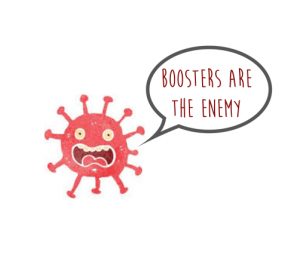Why do we need booster shots?
You’d think most vaccines would leave you protected from the disease for life, right? While some vaccines do have very long-lasting immunity to disease, certain vaccines need to be given more than once to make sure the body has that long-lasting protection. Vaccinations like these need to be given more than once to yield full protection from disease. These extra shots are called BOOSTERS.
The immune system needs to create memory cells that will recognize the pathogen should it enter the body. To do that the immune system needs to “see” the pathogen at least once and make antibodies necessary to fight it off. Once this happens, the immune system’s memory cells keep that pathogen in it’s memory banks, so to speak. How cool is that? The immune system is so darn amazing, isn’t it?
So the initial vaccination dose activates an immune response in the body so that memory cells are created. Sometimes this is all the body needs. But in some cases, additional doses of a vaccine might be needed periodically to “boost” the immune system’s memory of the disease.
For vaccines of diseases that can progress progress quickly to become a disease or have short-lived immunity, a booster dose of the vaccine is needed to keep sufficient memory. The booster dose serves as a reminder to the immune system to remember the antigens (substance that antibodies recognize as foreign) through re-exposure to the antigen.
This is particularly common with killed or inactivated vaccines.
In cases of slow-moving infections, the immune memory has plenty of time to respond and a booster may not be necessary to maintain immunity. And boosters aren’t necessary.
The routine vaccinations that need boosters (non-routine vaccines need boosters, also):
*MMR
*HPV
*Tetanus, diphtheria, and acellular pertussis
Recommended adult boosters (USA):
- Td/Tdap every ten years. In addition, the CDC and ACIP recommend that 1 dose of the Tdap vaccine is administered to pregnant women during each pregnancy (between 27 and 36 weeks’ gestation), regardless of prior vaccination. This is so important because it protects infants from pertussis in the first two months of life when they are particularly susceptible to whooping cough, a disease that can be fatal to newborns.
- MMR–all adults born after 1957 should have 1 or more doses of MMR even if the person has had a documented case or measles, mumps, or rubella. (People vaccinated before 1979 with either killed mumps vaccine or a mumps vaccine of an unknown type and are at high risk for mumps infection (such as health care workers) should strongly consider 2 doses of MMR.
- Zoster/shingles — USA one dose at 60 years.
- Varicella — All adults who don’t have evidence of immunity to varicella (such as documentation of 2 doses of the vaccine or history of the illness) receive 2 doses of single-antigen varicella vaccine. If they have already received a single dose, then a booster dose is highly recommended.
- Flu — one dose annually
Most parents follow the recommended vaccine schedule for their children, getting the proper boosters at check-ups. But many don’t recognize or they ignore the fact that they need vaccines to maintain immunity for themselves.
Adult boosters are important; not only do they protect the individual, but the community, including children, the elderly, the sick, and those unable to be vaccinated due to varying health conditions.
Make sure you are up-to-date on your vaccines, folks!!
(Vaccine recommendations come from the CDC.)


